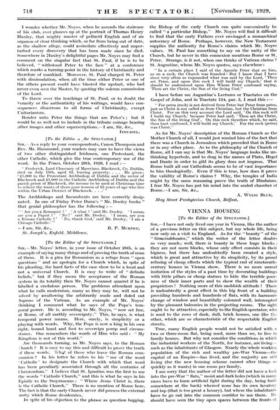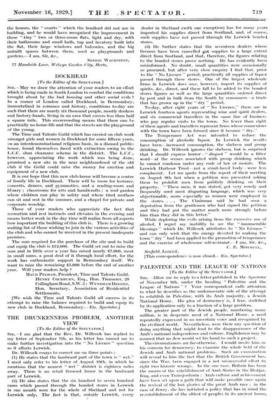VIENNA HOUSING
[To the Editor of the SPECTATOR.] SIR,—I have not only lived one year in Vienna, like the author of a previous letter on this subject, but my whole life, being now only on a visit to England. As for the " beauty" of the " Gemeindebauten," which the writer of the letter doubts so very much ; well, there is beauty in these huge blocks ; they are not mere blocks, whose only effect consists in their bigness, but there has undoubtedly been created a style, which is great and attractive by its simplicity, by its proud refusing of cheap effects which the typical end of nineteenth- century houses in Vienna show. There is no more unreal imitation of the styles of a past time by decorating buildings with little pillars or cheap statues to hide the terrible poor- ness of their inner parts and to show the wealth of their proprietors ! Nothing more of this snobbish attitude ! There is undoubtedly a great effect in this big front of a building providing hundreds and hundreds of flats, with its harmonic change of window and beautifully coloured wall, intercepted by the pleasant balconies in the projecting rooms. The sight ought to be attractive, especially to the English spectator, who is used to the rows of dark, dull, brick houses, one like the other, which are so characteristic of the respectable English streets.
True, many English people would not be satisfied with a two or three-room flat, being used, more than we, to live in family houses. But why not consider the conditions in which the industrial workers of the North, for instance, are living— such as the inhabitants of Glasgow. Nearly thewhole working population of the rich and wealthy pre-War Vienna—the capital of an Empire—has lived, and the majority are still living (for the new housing scheme cannot alter things as
quickly as it wants) in one room per family. •
I am sorry that the author of the letter did not have a look into the pre-War " flats," moist and dark holes (which in many cases have to burn artificial light during the day, beiing built somewhere at the back) whereof none has its own lavatory and tap (that is too great a luxury), but where the inhabitants have to go Out into the common corridor to use them. He should have seen *the tiny open Spaces between the fronts of
the houses,- the " courts " which the landlord did not use in building, and he would have recognized the improvement in these " tiny " two or three-room flats, light and dry, with their bathrooms and small halls, tap and lavatory built into the flat, their large windows and balconies, and the big unbuilt spaces between them, used as playgrounds and gardens.—I am, Sir, &c.,
SOPHIE WACHSTEIN,
77 Handside Lane, Welwyn Garden City, Herts.









































 Previous page
Previous page